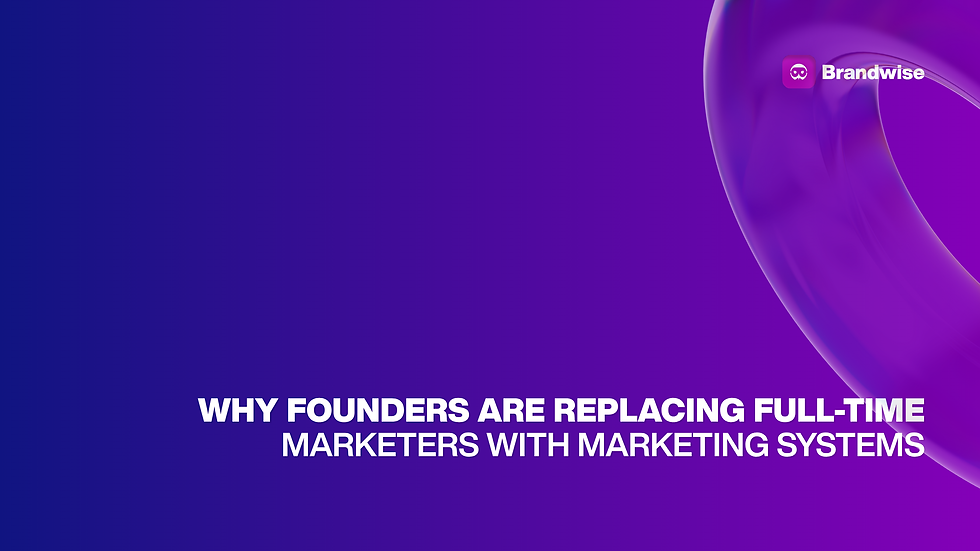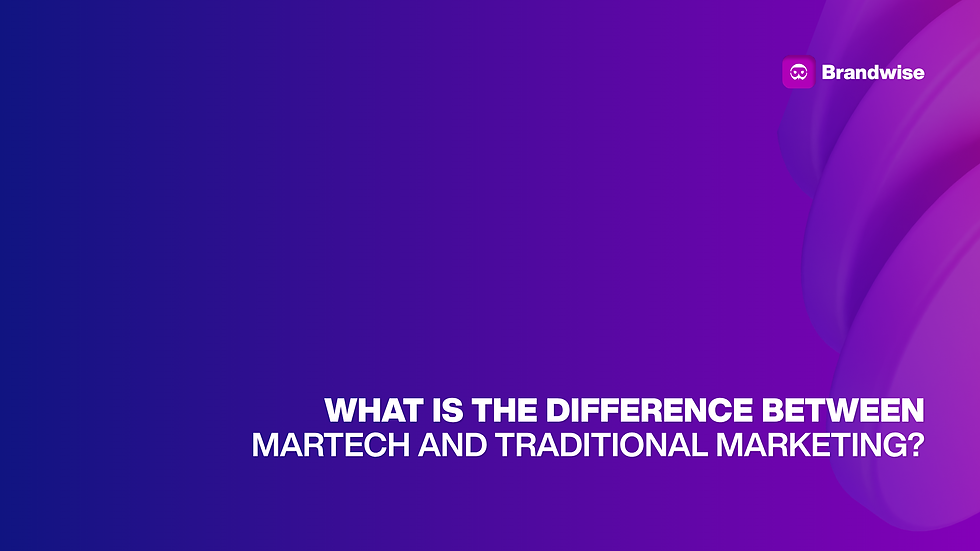Why Founders Are Replacing Full-Time Marketers with Marketing Systems
- Brand Wise

- Jul 17, 2025
- 6 min read
Updated: Jul 18, 2025

Let’s cut to the chase: most early-stage founders don’t actually need a full-time marketer. What they need is a marketing system — something lean, structured, and scalable that gets real results without burning time, budget, or team energy.
We’ve seen this again and again: a founder hires a marketer, expects magic, gets overwhelmed by half-finished campaigns and unclear ROI, and ends up thinking “marketing doesn’t work.”It’s not that marketing doesn’t work. It’s that the setup was wrong from the start.
Modern founders are realizing this. They’re no longer chasing unicorn hires. They’re replacing bloated marketing functions with streamlined systems that plug into their business like an operating layer — one that actually runs, learns, and delivers. Table of Contents: 1. The Real Problem: Traditional Marketing Isn’t Built for Startups
The Real Problem: Traditional Marketing Isn’t Built for Startups
Traditional marketing teams are built for scale, not for survival.
They’re structured like corporate machines: specialists in silos, long approval chains, brand decks no one reads, and campaigns that take months to launch. That model might work when you’ve got 500 employees, a legal team, and quarterly targets.
But startups? Startups move fast, break things, pivot weekly, and live in the red for months. You don’t have time for a slow ramp-up. You need traction yesterday.
Here’s what usually happens:
You hire one marketer and expect them to do the job of five.
You burn cash waiting for results from a strategy that never got validated.
You rely on tools, but no one has time to connect or optimize them.
You end up either micromanaging or ghost-managing your marketing.
And let’s not ignore the burnout. One person juggling growth strategy, content calendars, ad testing, SEO audits, and email sequences? That’s not sustainable — or smart.
Startups don’t need “more marketers.” They need a system that takes care of the moving parts so the founder can stay focused on the product, not the post captions.
It’s not that marketing doesn’t work. It’s that the marketing model was never built for your stage.
The Rise of Marketing Systems: What Founders Want Instead
Founders don’t want headcount. They want momentum.
That’s why more of them are skipping the traditional hiring path and installing marketing systems instead — structured, modular frameworks that actually do the work and scale with the business.
Think of it like this: Would you rather hire five different people to build, send, and track your email campaigns — or plug in one automated system that does it on schedule, based on triggers, with clear metrics and zero back-and-forth?
Here’s what a system-first mindset looks like:
Clear workflows instead of random tasks.
Automations that run while you focus on your next product sprint.
Pre-built playbooks that cut guesswork and decision fatigue.
Data visibility is baked in from the start.
Systems don’t sleep, don’t miss deadlines, and don’t need onboarding. They plug into your business and just run with strategic oversight when needed, but minimal founder involvement.
Founders aren’t ditching marketing. They’re ditching inefficiency and once they do, they don’t go back.
Cost Efficiency: Systems Outperform Full-Time Teams
Let’s talk money — because that’s where this shift hits hardest.
Hiring a full-time marketing team costs anywhere from $2K to $7K+ per month (and that’s being generous). Now factor in onboarding time, software licenses, training, revision loops, and the fact that no one hire can do everything. You’ve just dropped a small funding round on a team that still needs direction.
Now compare that to a marketing system:
Built to run autonomously
No hiring lag or sunk onboarding costs
Comes with tools, processes, and performance tracking
Can scale up or down based on need, not salary bands
A system doesn't ask for equity. It doesn’t need vacation days. It doesn’t burn out halfway through the quarter.
More importantly, a system is outcome-aligned. It’s not clocking in for the sake of activity. It’s structured around KPIs that matter — leads, conversions, brand visibility, funnel performance.
This is why founders are flipping the model: Why pay for time when you can pay for outcomes?
If you’re early-stage, every dollar has a job. Systems make sure your marketing dollars actually work, not just sit in a Slack channel waiting for direction.
Flexibility and Speed: Systems > Headcount
Startups don’t have time for hierarchy. They need speed. That’s exactly where systems outperform traditional marketing hires — every time.
When something breaks, you fix it. When a campaign underperforms, you pivot. You can’t afford to wait three weeks for a strategy doc, five days for feedback, and another two for execution.
Systems remove the lag.
You want to:
Test 3 landing page variants? Done by the end of the day.
Switch from organic to paid mid-week? Easy.
Launch a new email sequence based on user behavior? Already live.
See real-time performance? Pull the dashboard — not a meeting.
Systems are modular. That means you don’t need to commit to a 12-month hire to experiment with SEO or email. You plug in what you need, when you need it — and remove what you don’t. That’s true agility.
Traditional marketing = rigid structure.System-based marketing = dynamic sprints.
That flexibility isn’t just convenient — it’s a survival advantage. And in early-stage growth, speed is leverage.
Marketing Is Now a System, Not a Department
The old model treated marketing like a siloed team tucked away in a corner of the org chart. Strategy here, design there, content somewhere else. Endless meetings, unclear ownership, and a whole lot of “we’ll get to it next sprint.”
But modern founders don’t want a department. They want a system that runs, reports, and scales — without drama.
Marketing today isn’t about headcount. It’s infrastructure. It’s something you install, not something you babysit.
Here’s what that looks like in real terms:
Workflows are mapped.
Funnels are templated.
Channels are automated.
Content runs on a calendar, not guesswork.
Attribution isn’t a mystery — it’s a dashboard.
This shift flips everything. Instead of hiring to fill gaps, founders configure systems to meet goals. Instead of chasing virality, they build consistent touchpoints that move buyers.
A system doesn’t argue about tone or waste time in feedback loops. It just delivers with data, consistency, and zero ego.
The result? More growth. Less chaos. No burnout.
When to Use Systems — and When a Human Marketer Still Matters
Let’s be clear: this isn’t about replacing people with robots. It’s about removing inefficiency and putting people where they matter most.
Systems shine when the tasks are:
Repeatable
Data-driven
Workflow-based
Low-context
Execution-heavy
Things like:
Email sequences
A/B testing landing pages
Keyword tracking
Campaign reporting
Social scheduling
Lead scoring
Funnel automation
All of that? System territory. Set it up once, tweak as needed, let it run.
But strategy still needs a brain. And vision? That’s never fully automatable.
Here’s where human marketers are irreplaceable:
Shaping brand identity and tone of voice
Crafting differentiated positioning and messaging
Understanding audience nuance beyond the data
Aligning GTM with business goals
Storytelling with depth, not just templates
Bridging marketing with product, sales, and ops
Best case scenario?A lean, high-level marketer (or external strategist) overseeing a smart system. They don’t push pixels or schedule posts — they orchestrate outcomes.
The system runs the engine. The human steers the ship.
You don’t need five marketers doing busywork. You need one strategic mind + one powerful system running like clockwork.
Conclusion
Startups don’t fail because they lack talent. They fail because they rely on outdated models. Marketing isn’t a department anymore — it’s a system. One that’s automated, outcome-driven, and built to scale without bloated overhead.
The smartest founders aren’t hiring more people. They’re installing systems that actually move the needle. If you're building fast and lean, don't waste months managing marketing chaos. Install the engine. Let it run. Get results.
Discover Brandwise's Digital Marketing Solutions
At Brandwise, we specialize in providing comprehensive digital marketing solutions tailored to your business needs. Our services cover branding and identity creation, website development, social media management, content strategy, SEO, paid advertising, data analysis, and more.
Whether you're looking to build your online presence or optimize your marketing strategies, we have the expertise to help you succeed.
If you're ready to take the next step and make an informed decision for your next project, click the button to see our plans.
For more inspiration and to see our innovative projects, visit our showcase.



